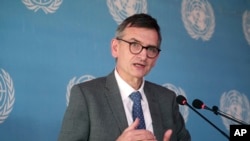Perthes, a German national, formally announced his departure while presenting a report on Sudan’s situation to the U.N. Security Council on Wednesday. Though Perthes was declared persona non grata in June by the Sudanese government, while speaking at the Sept. 13 briefing Perthes officially requested U.N. Secretary-General António Guterres to relieve him of his duties.
Kamal Omer, a member of Sudan’s the Popular Congress Party, commended Perthes for his role in consolidating various Sudanese political parties underscoring the significant support provided by the U.N. to Sudan’s political landscape.
“We have greatly benefited from unwavering support from the U.N. mission. It has made substantial contributions to Sudan’s political history, and we are here to affirm his effectiveness and commitment to Sudan’s political process,” Omer said.
Conversely, former Sudanese ambassador to China, Ali Yousif, welcomed Perthes’ resignation, describing it as a necessary step.
Yousif, the secretary-general of the Association of Arab-Chinese Friendship Societies, said Perthes had no alternative but to resign due to consistent pressure from the Sudanese government.
“This is a prudent course of action for him since he has already been declared persona non grata. The U.N. cannot compel his presence against the will of the Sudanese government. His resignation is the appropriate course,” Yousid told VOA.
Sudan called Perthes to quit in June accusing the envoy of bias, not respecting “national sovereignty” and exacerbating fighting between the army led by Gen. Abdel Fattah al-Burhan and the Rapid Support Forces led by Mohamed Dagalo.
The U.N. responded saying Sudan’s call was “not applicable to or in respect of United Nations personnel,” and contrary to the East Africa nation’s obligation to the U.N. charter.
Abdu Mukhtar Musa, a political science lecturer at Khartoum University, downplayed the significance of Perthes’ resignation, arguing that for over two years the U.N. envoy has failed to identify Sudan’s key political issues, rendering his continued tenure superfluous.
“The resolution to the Sudanese crisis is primarily a domestic issue linked to the nation's internal politics,” Musa said.
Perthes’ legacy as Sudan’s conflict rages
Perthes was appointed by Guterres to lead the global agency’s mission in Sudan in January 2021. In October 2021 Burhan took control of Sudan after a military coup ousting the civilian prime minister, Abdalla Hamdok.
Since mid-April, the previously aligned Sudan army and the paramilitary Rapid Support Forces, have waged a monthslong conflict that has left 4,000 people dead and 4 million displaced according to August U.N. figures.
Sudanese political analyst Kholood Khair, the founding director of the Khartoum-based think tank Confluence Advisory, told VOA Perthes faced a challenging tenure during which Sudan’s political landscape rapidly shifted.
While Khair acknowledges the primary responsibility for the current conflict rests with the warring military factions, the army and the RSF, she says Perthes “was remiss in not recognizing the signs of an impending conflict.”
Khair criticized the U.N. envoy for allegedly presenting a misleading picture of the situation leading up to the conflict during U.N. Security Council meetings.
She observed that Perthes often portrayed an overly optimistic view of the preceding political process, reassuring the Security Council about an imminent final agreement to return Sudan to civilian rule.
During Wednesday’s briefing to the U.N. Security Council, Perthes warned of the potential escalation of Sudan’s conflict into a full-blown civil war, strongly condemning both warring parties for serious rights abuses and war crimes, including ethnic targeting of civilians, sexual assault, indiscriminate shelling, and airstrikes on civilian areas.
“Wednesday’s briefing was probably one of the better briefings that (Perthes) had done because I suppose he no longer feared the consequences of telling the truth, and the unvarnished truth,” Khair said, adding “It comes a little too late.”
Khair believes Perthes’ legacy will be marked by his failure to raise the alarm about the conflict before it occurred.
Efforts to end Sudan’s five-month-long conflict have continued with various cease-fires abandoned, and futile regional mediations by the African Union and the east African regional bloc IGAD, as well as the U.S., European Union, Saudi Arabia and some of Sudan’s neighbors.
Editor's Note: This article was updated to correctly reflect the statement made by Volker Perthes during his final Sudan briefing at the U.N. Security Council.







![Mixed Reactions in Sudan as UN Envoy Resigns [3:46]](https://gdb.voanews.com/01000000-0aff-0242-ede1-08db5eefa3eb_w33_r1.jpg)
![UN Sudan Envoy Resigns Amid Escalating Conflict [5:34]](https://gdb.voanews.com/5e37427e-9c00-4ca5-b633-e264832af9d3_w33_r1.jpg)



Forum